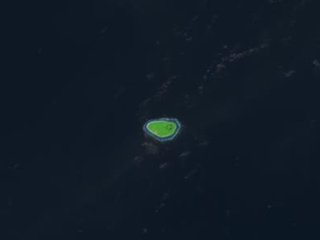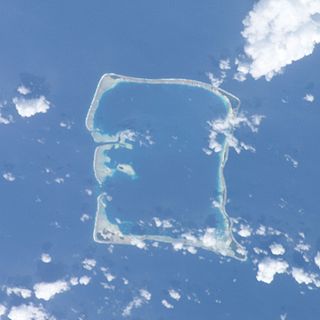Related Research Articles

Tuvalu is an island country in the Polynesian subregion of Oceania in the Pacific Ocean. Its islands are situated about midway between Hawaii and Australia. They lie east-northeast of the Santa Cruz Islands, northeast of Vanuatu, southeast of Nauru, south of Kiribati, west of Tokelau, northwest of Samoa and Wallis and Futuna, and north of Fiji. Tuvalu is composed of three reef islands and six atolls. They are spread out between the latitude of 5° and 10° south and between the longitude of 176° and 180°. They lie west of the International Date Line. Tuvalu has a population of 10,507. The total land area of the islands of Tuvalu is 26 square kilometres (10 sq mi).

The first inhabitants of Tuvalu were Polynesians, so the origins of the people of Tuvalu can be traced to the spread of humans out of Southeast Asia, from Taiwan, via Melanesia and across the Pacific islands of Polynesia.

Tuvaluan, often called Tuvalu, is a Polynesian language of or closely related to the Ellicean group spoken in Tuvalu. It is more or less distantly related to all other Polynesian languages, such as Hawaiian, Māori, Tahitian, Samoan, and Tongan, and most closely related to the languages spoken on the Polynesian Outliers in Micronesia and Northern and Central Melanesia. Tuvaluan has borrowed considerably from Samoan, the language of Christian missionaries in the late 19th and early 20th centuries.

The Gilbert Islands are a chain of sixteen atolls and coral islands in the Pacific Ocean, about halfway between Papua New Guinea and Hawaii. From 1976 to 1979, they were the “British colony of the Gilbert Islands”, and before that, from 1916 to 1975, they were the “Gilbert and Ellice Islands colony”. They constitute the main part of the nation of Kiribati.

Vaitupu is the largest atoll of the nation of Tuvalu. It is located at 7.48 degrees south and 178.83 degrees west. There are 1,061 people living on 5.6 square kilometres with the main village being Asau.

The Gilbert and Ellice Islands in the Pacific Ocean were part of the British Empire from 1892 to 1976. They were a protectorate from 1892 to 12 January 1916, and then a colony until 1 January 1976. The history of the colony was mainly characterized by phosphate mining on Ocean Island. In October 1975, these islands were divided by force of law into two separate colonies, and they became independent nations shortly thereafter: the Ellice Islands became Tuvalu in 1978, and the Gilbert Islands became part of Kiribati in 1979.

Nanumea is the northwesternmost atoll in the Polynesian nation of Tuvalu, a group of nine coral atolls and islands spread over about 400 miles (640 km) of Pacific Ocean just south of the equator and west of the International Date Line. Nanumea is 4 km2 (1.5 sq mi) with a population of 512 people.

Niulakita is the southernmost island of Tuvalu, and also the name of the only village on this island. Niulakita has a population of 34. The residents of Niulakita have moved to the island from Niutao. Niulakita is represented in the Parliament of Tuvalu by the members of the constituency of Niutao.

Nui is an atoll and one of nine districts of the Pacific Ocean state of Tuvalu. It has a land area of 3.37 km² and a population of 610.

Niutao is a reef island in the northern part of Tuvalu. It is one of the nine districts (islands) of Tuvalu. It is also one of the three districts that consist of only one island - not counting the three islets inside the closed lagoon. Niutao has a population of 582.

Nukulaelae is an atoll that is part of the nation of Tuvalu, and it has a population of 300. The largest settlement is Pepesala on Fangaua islet with a population of 300 people. It has the form of an oval and consists of at least 15 islets. The inhabited islet is Fangaua, which is 1.5 kilometres (0.93 mi) long and 50 to 200 metres wide. The easternmost point of Tuvalu is Niuoko islet. The Nukulaelae Conservation Area covers the eastern end of the lagoon. A baseline survey of marine life in the conservation zone was conducted in 2010.

Nukufetau is an atoll that is part of the nation of Tuvalu. The atoll was claimed by the US under the Guano Islands Act some time in the 19th century and was ceded in a treaty of friendship concluded in 1979 and coming into force in 1983. It has a population of 597 who live on Savave islet. In 1951 the school that was located on Motumua islet was transferred to Savave and became the government primary school for Nukufetau. It was named the Tutasi Memorial School in honour of its predecessor.
Protestants in Tuvalu- Tuvalu is one of the most heavily Protestant nations in the world. The Congregational Christian Church of Tuvalu,, is the de facto state church of Tuvalu, the only established church in the Reformed tradition in the world. Its adherents comprise about 97% of the 12,000 inhabitants of the archipelago, and theologicly it is part of the Reformed tradition.
The Congregational Christian Church of Tuvalu, commonly the Church of Tuvalu, is the state church of Tuvalu, although this status merely entitles it to "the privilege of performing special services on major national events". Its adherents comprise about 97% of the ~11,000 inhabitants of the archipelago, and theologically, it is part of the Calvinist tradition.

Nikunau is a low coral atoll in the Gilbert Islands and forms a council district of the Republic of Kiribati. It consists of two parts,, joined by an isthmus about 150 metres (490 ft) wide.

The following outline is provided as an overview of and topical guide to Tuvalu:

Funafuti is an atoll and the capital of the island nation of Tuvalu. It has a population of 6,320 people, making it the country's most populous atoll, with 60.15 per cent of Tuvalu's population. It consists of a narrow sweep of land between 20 and 400 metres wide, encircling a large lagoon 18 km long and 14 km wide. The average depth of the Funafuti lagoon is about 20 fathoms. With a surface area of 275 square kilometres (106.2 sq mi), it is by far the largest lagoon in Tuvalu. The land area of the 33 islets around the atoll of Funafuti totals 2.4 square kilometres (0.9 sq mi); taken together, they constitute less than one per cent of the total area of the atoll. Cargo ships can enter Funafuti's lagoon and dock at the port facilities on Fongafale.

Niuoko Islet is the easternmost point of Tuvalu, which is located in Nukulaelae Atoll.
Neli Lifuka was born in 1909 on Vaitupu, he worked as a marine engineer and from 1945 to 1951 he was the magistrate on Vaitupu. He organised the collection of the funds necessary to purchase Kioa island in Fiji in 1946 and in 1956 he joined the Kioa community and became the chairman of the council.

Donald Gilbert Kennedy was a teacher, then an administrator in the British colonial service in the Gilbert and Ellice Islands Colony and the British Solomon Islands Protectorate. For his services as a Coastwatcher during the Pacific War, he was awarded the DSO, and the Navy Cross (U.S.). He published journal articles and books on the material culture of Vaitupu atoll, land tenure and the language of the Ellice Islands.
References
- ↑ Goldsmith, M. and Munro, D. (1992). "Encountering Elekana Encountering Tuvalu". Rubinstein, D.H. Ed. Pacific History: Papers from the 8th Pacific History Association Conference: 25–41.
{{cite journal}}: CS1 maint: multiple names: authors list (link) - ↑ Luker, V.; Lal, B. V., eds. (2013). Telling Pacific Lives: Prisms of Process. ANU Press. p. 110.
- 1 2 3 4 Kofe, Laumua (1983). "Chapter 15, Palangi and Pastors". Tuvalu: A History. University of the South Pacific/Government of Tuvalu. p. 110.
- ↑ Goldsmith, Michael & Munro, Doug (2002). The accidental missionary: tales of Elekana. Macmillan Brown Centre for Pacific Studies, University of Canterbury. ISBN 1877175331.
- ↑ Goldsmith, M. and Munro, D. (1992). "Conversion and Church Formation in Tuvalu". Journal of Pacific History. 27 (1): 44–54. doi:10.1080/00223349208572690.
{{cite journal}}: CS1 maint: multiple names: authors list (link) - ↑ Besnier, Niko (1995). Literacy, Emotion and Authority: Reading and Writing on a Polynesian Atoll . Cambridge University Press. pp. 153–177.
- ↑ Besnier, Niko (2009). Gossip and the Everyday Production of Politics . University of Hawaii Press. p. 48.
- ↑ "Elekana Tuvalu-Christianity Memorial 1861". geoview.info. 7 April 2008. Retrieved 21 May 2017.